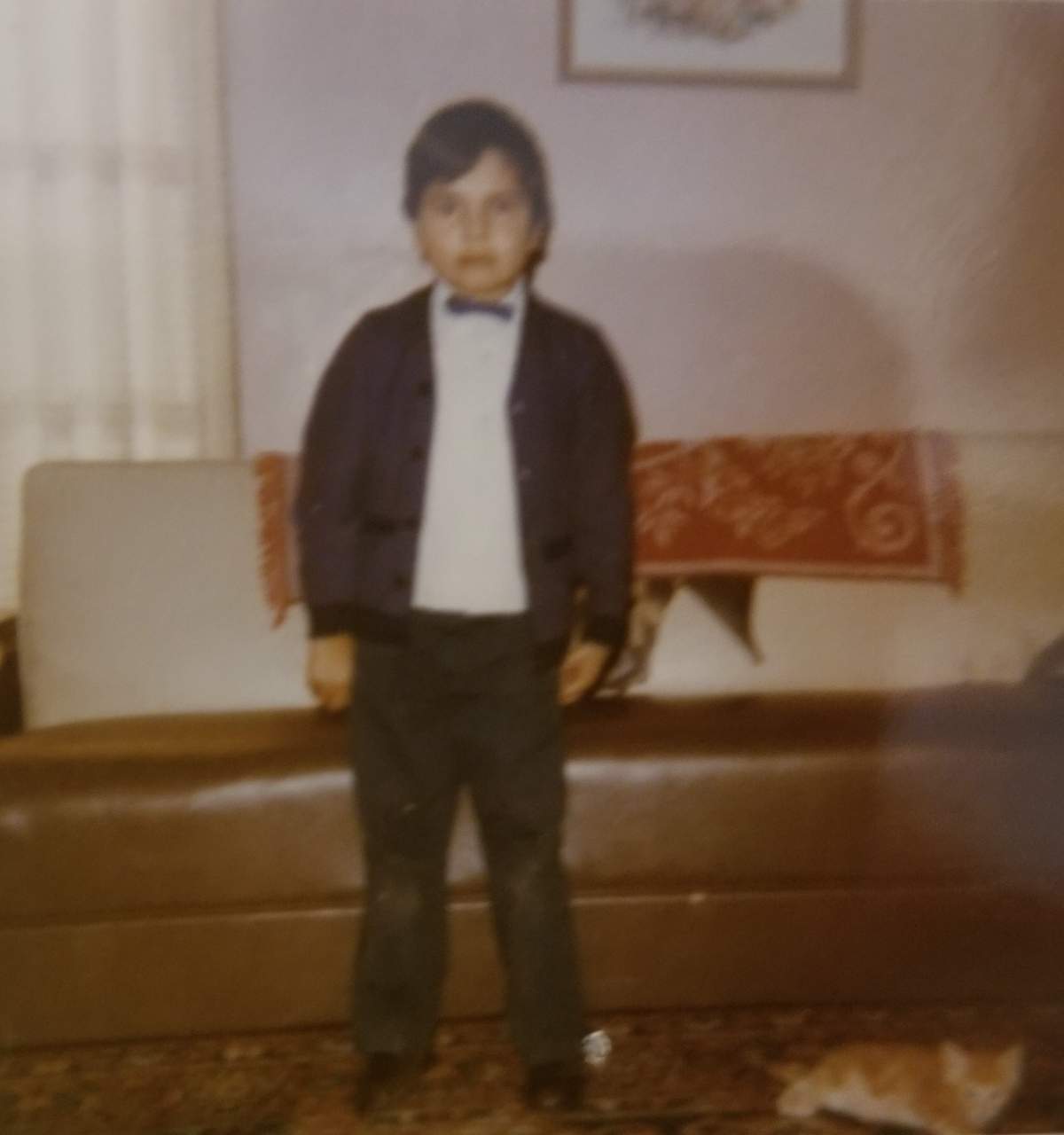Adam North Peigan knows trauma runs deep.

In his case, North Peigan said his parents’ suffering had been passed down generation to generation. To him and now his children.
North Peigan, 57, president of the Sixties Scoop Indigenous Society of Alberta, and the newly named national president of the Legacy of Hope Foundation, is from the Piikani First Nation in Treaty 7 territory in southern Alberta. Both of his parents were forced to attend an Indian Residential School (IRS).
The discovery of the remains of 215 Indigenous children found in an unmarked burial site at a former residential school in Kamloops, B.C., brought back a flood of emotion.
“It’s been really, really traumatic,” said North Peigan, from his home in Edmonton, Alta. His parents survived the residential school system but the years following the return to their community were marred by the scars unseen.
North Peigan and his siblings were taken from their home during the Sixties Scoop, a government policy that forcibly removed Indigenous children from their birth parents and sent to foster homes and other families for adoption.
North Peigan said he lived in a number of different foster homes and it wasn’t until he aged out of the child welfare system in 1978 that he was able to return back to his first nation.
“I came home with a lot of anger and a lot of rage,” said North Peigan, “because I blamed my mother — that she wasn’t able to keep our family together.
“That anger and rage that I packed around,” choked North Peigan, “it led me down about 15, 20 years of heavy, heavy, heavy drinking.”
Trying to come to terms with abandonment, a loss of language and culture, North Peigan ended up on the streets of Vancouver. He was homeless, addicted to alcohol and drugs and at one point overdosed.
It wasn’t until North Peigan went into treatment that he was able to return to his birth mother and confront that anger.
“My mother shared with me her stories and her trauma and what she had to go through as part of when she was in the residential schools,” North Peigan said.

Get breaking National news
“Because of all that trauma and all that history of what they had to endure, it affected their ability to be good parents.”
Both his mother and father have since passed away, but North Peigan said he had 40 years to work on his relationship with his mother. At times it was “toxic” and in no way a “bed full of roses,” said North Peigan, but he came to understand how she suffered “her own atrocities” and that helped work through his resentment toward her.

“She talked about the abuse that she suffered and the fact that they weren’t allowed to talk their own language. That her hair was cut quite short and that they were made to be, to dress in uniforms, and she talked about the physical abuse that happened to her, and the spiritual abuse and the mental abuse.
“I really feel that because of what happened to her in residential school, that I was robbed of that relationship with my parents.
“It was taken away from me and that’s something I’ll never, ever, ever be able to get back again.”
North Peigan, a father of three daughters, said with parenting ties severed when he was just a child, he had no guidance on how to raise a family and keep that family together.
“The reason I failed as a parent in some spots was because of what happened to me.
“They have suffered their own hardship in their lives and they have had to be very, very resilient themselves,” said North Peigen of his now adult children.
One is in continuing care in Calgary, Alta., and the other two attending the University of British Columbia, in Vancouver.
Wenonah North Peigen, 23, just completed an arts degree in political science.
She said growing up she was primarily raised by her mother in Calgary and didn’t always understand why she wasn’t in contact with her dad.
“As I’ve gotten older and I’ve learned more about what he’s gone through,” said Wenonah, “I’ve come to realize my dad isn’t just my dad. He’s a person on his own that’s healing from his own traumas.”
Wenonah said that disconnect has impacted her sisters in different ways, but now understanding intergenerational trauma, she could see her dad was “hurting in his own way.”
Both sides of Wenonah’s family have been impacted by residential schools. Three of her four grandparents had been sent away from their families and growing up she said she never learned the traditional languages or much about the dark history in high school.
It wasn’t until university that she began to understand the impact of residential schools on her family. It has helped strengthen her relationship with both her parents.
“In the same sense, I feel very proud of my parents and grandparents,” said Wenonah.
“For them to overcome that and to raise such strong and beautiful children, I think is something to be proud of.”
Wenonah said when she has children of her own, she hopes they grow up feeling that same pride.
Wenonah North Peigan, 23, says learning about her grandparents in residential schools has led to a better understanding of her father’s pain and suffering.June 2, 2021
Talking openly about the wrongs of the past and residential schools can help, said Amy Bombay, a researcher and associate professor at Dalhousie University, in Halifax, NS.
“A lot of people are hearing about it for the first time and I think it’s a really key piece to understanding why we see the health inequities and social inequities we do in Indigenous populations today.”
Bombay’s grandparents were also in residential schools. The unsettling history led her to the core of her research, which has focused on the health impacts of intergenerational trauma.
“We’re talking about serious, traumatic, horrendous things.”
Bombay said generations of children who went through chronic adversity and trauma during their developmental years, put them at risk throughout their lives for mental and physical health problems.
“Not only in those who attended residential schools but in their children and grandchildren.”
Substance use is higher in the generations affected, said Bombay, and studies show IRS parents were more likely to be affected by the child welfare system.
“So that next generation was more at risk for being taken away from their parents,” Bombay said, but by no fault of their own.
“The research has been really consistent in showing at least the second and third generations are very much impacted still.
“The children and grandchildren are at greater risk for psychological distress,” Bombay said. “So symptoms of anxiety and depression, compared to those Indigenous families who were not affected by the residential school system.”
Bombay said many Canadians still don’t know about colonial issues that continue to perpetrate the trauma. She pointed to the “stark” disproportionate amount of Indigenous children in government care.
She said non-Indigenous families can help by become allies and speak out against stereotypes and racism, and support political leaders who make Indigenous issues a priority.
She stressed it’s critical all Canadians realize residential schools are not in the past, “survivors are still here today.”
“I think that we’ve only kind of scratched the surface because those intergenerational effects are so deep and pervasive and there’s still a lot of work to do.”
North Peigan said his healing has continued and future generations will be forced to deal with the wounds as well. Not only from residential schools, but the Sixties Scoop, Missing and Murdered Indigenous Women and Girls and forced sterilization of women.
“One thing that really bothers me,” said North Peigan, “when I hear our non-native brothers and sisters, mainstream Canadians, say ’Get over it. It happened in the past. You guys need to get over it.’ You know what, I don’t agree with that because they failed to understand the history of the Indigenous people in Canada and what we had to endure.”
His hope is that each generation will become healthier and when his daughters have children, they’ll be able to keep family together.
“That families won’t be broken.”
Anyone experiencing pain or distress as a result of their residential school experience can access this 24-hour, toll-free and confidential National Indian Residential School Crisis Line at 1-866-925-4419.










Comments